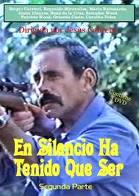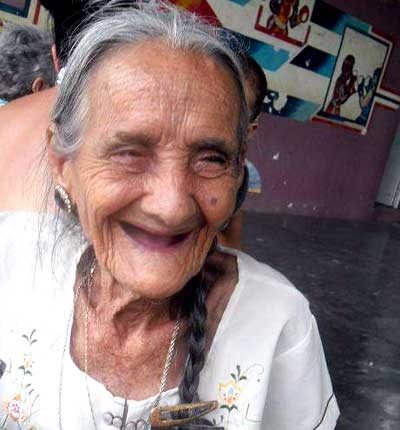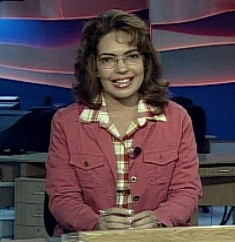When I asked him: What kind of places would you like to visit? He answered: All the places you have on the schedule, say, if you have included the Ignacio Agramonte Museum, that park with four palms and the equestrian statue and the ancient Church of San Juan de Dios if they included.
To me, it was an unforgettable if not a pride-giving week along Corrieri. I was taking a walk through the cobbled streets with the actor who played the role of many Cuban heroes highly beloved by the Cuban people. The audience admired both Sergio Corrieri’s professional work and his moral characteristics- a modest and cheerful person who liked to greet people on the streets.
We met again on May 1985, when both were appointed Vice-presidents of the Cuban Institute of Radio and Television. During our everyday work I was able to perceive Coririeri’s moral values as a co-worker, a friend, a person who enjoyed helping other people, and who was so friendly that inspired confidence and security.
I hardly believed it, when I heard the sad news of Corrieri’s death in the morning of February 29, 2008. Sergio Corrieri. He was going to turn 69 years old two days later, and was having a successful professional life as an actor, a theater director, and a leader of a new society, in which he firmly believed.
Corrieri was born in Havana City, in 1939. His figure and face became emblematic for the Cuban movie, since his performance in “Memorias del Subdesarrollo” , “El hombre de Maisinicú” Mella, “Rio Negro”, Baragua, just to mention five of the 14 films he performed. He also had an outstanding performance on television when he played David in “En silencio ha tenido que ser” series and “El regreso de David”. Those moments will be always part of the best memories of Cuban Television, of all times.
The actor also played Federico Garcia Lorca in “Yerma” by directors Mirta Muñiz and Amaury Perz García; which was the first film produced for the Cuban television.
He directed his own version of “La Emboscada” in 1994, for the Cuban TV and won a Caracol Award granted by the Association of Cuban Writers and Artists (UNEAC) in that year, for Best Director and Best Adaptation.
Sergio Corrieri made incursions in Theatre at the university in 1954. From 1956 to 1958, he performed in several plays like “Un Cuarto lleno de rosas” written by E. Summers and directed by Ponce de Leon.
In 1958, he became a founding member of the Teatro Estudio Company as an actor and artistic director. Some of his plays included: “Viaje de un dia largo hacia la noche” by Eugene O’Neill and “La Ronda”. He directed the world premiere “Contigo pan y cebolla” by Hector Quintero, staged on February 6, 1964 at the Havana-based Hubert de Blanck theater.
In 1968, the actor created the Escambray Theatre Group, a new experience for Cuban theater characterized by critics and participation, which contributed to the professional training of many theater artists who became outstanding figures on the Cuban stage.
As an actor, artistic and general director of the Escambray group, Corrieri attended a Festival of Nations and made a tour through several cities in the United States, Canada, Latin America and Europe.
In 1990 he was appointed President of the Cuban Friendship Institute (ICAP), a position he held wisely until the day of his death. He visited over 60 countries from all continents during the battle for the return to Cuba young child Elian Gonzalez and the founding of the Friendship Committee to support the Cuban revolution in its struggle for the Five Cuban heroes held in US prisons.
At the peak of his career, Corrieri gave up his fame and popularity in order to make incursions in a more complex fields. He was prepared to fulfill the tasks entrusted to him, since he felt himself able to assume them also with artistic delight.
Sergio Corrieri was a member of the Cuban Parliament in three sessions and received important national and international awards such as the Alejo Carpentier Medal and the National Theater Award 2006.
Despite he was sick some months before his death occurred; he accomplished the mission of chairing the Organizing Committee of the Congress of Cuban Artists.
As a Theatre Professor, Corrieri collaborated with the Municipal School of Marianao, the National School of Art Instructors, and the Higher Institute of Arts, in Havana.
Corrieri received significant awards as an actor and director -both national and international- for his work in the theater and the movies, in countries such as Finland, Russia, the United States, and Bulgaria, among others.
Some Awards include:
– Award for Best Male Performance at the International Film Festival of Moscow, in the film: El hombre de Maisinicú.
– Gold Medal for best artistic direction of a show at the seventh World Festival of Youth and Students in Finland.
– The Ollantay Prize by the Latin American Center of Creation and Theatre Research (CELCIT)
Sergio Corrieri has passed away, but his artistic legacy remains as an inspiring work; the curtain has been closed for him, and he will always be recalled as an artist, but above all, as our close friend and honorable man who was worth of the greatness of his people.
An English version by: Silke Paez Carr




